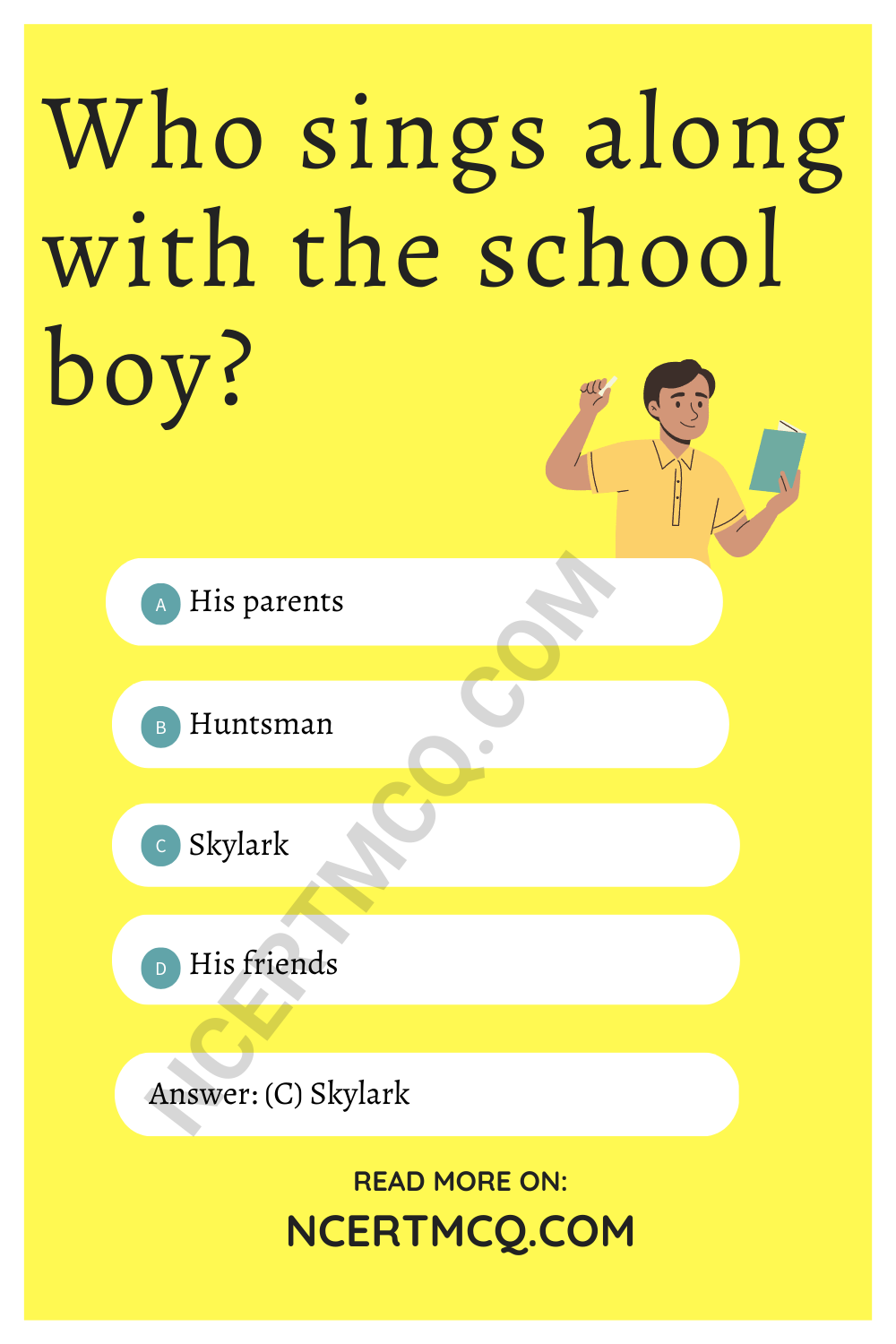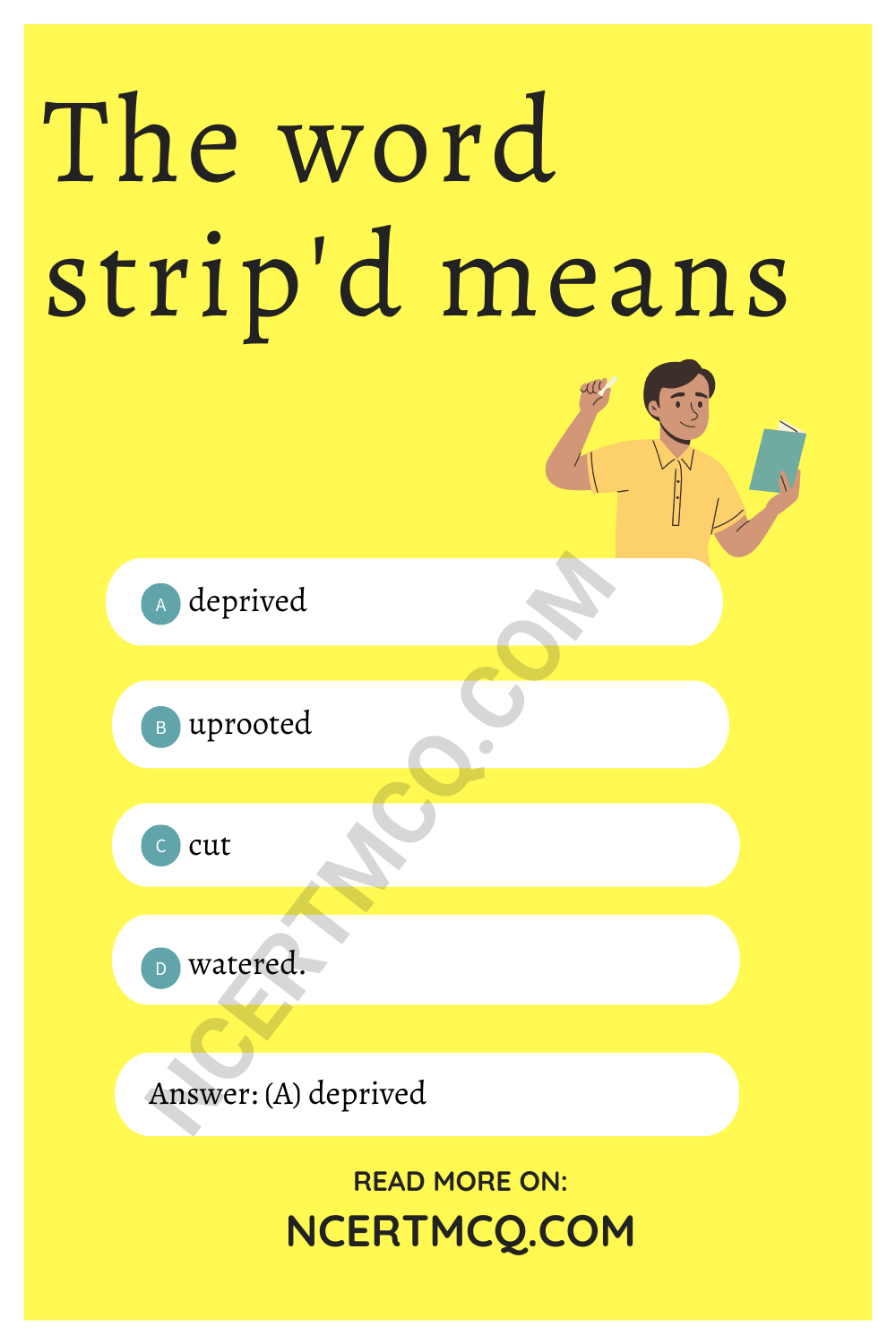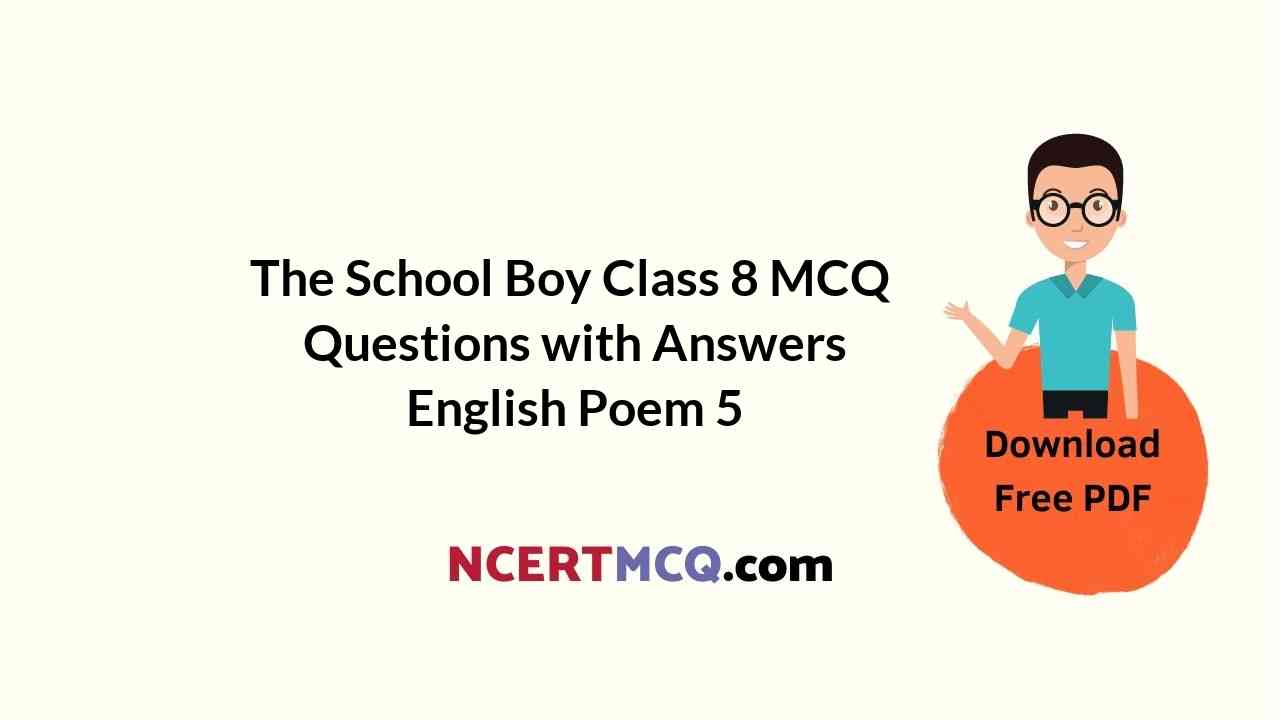Check the below Online Education NCERT MCQ Questions for Class 8 English Honeydew Poem 5 The School Boy with Answers Pdf free download. MCQ Questions for Class 8 English with Answers were prepared based on the latest exam pattern. We have provided The School Boy Class 8 English MCQs Questions with Answers to help students understand the concept very well. https://ncertmcq.com/mcq-questions-for-class-8-english-with-answers/
Students can also visit the most accurate and elaborate The School Boy Class 8 Questions and Answers. Every question in the textbook has been answered here.
MCQ Questions for Class 8 English Honeydew Poem 5 The School Boy with Answers
The School Boy MCQ Class 8 Question 1.
Who is he talking to when he says “if buds are nip’d…”
(a) His parents
(b) Teacher
(c) Caged bird
(d) All of the Above
Answer
Answer: (a) His parents
The School Boy Class 8 MCQ Question 2.
“Nor in my _____ can I take delight”
(a) Book
(b) Learning bower
(c) Dreary shower
(d) All of the Above
Answer
Answer: (a) Book
MCQ Of The School Boy Class 8 Question 3.
What drives all the joy away?
(a) Caged bird
(b) Nip in the bud
(c) Blown blossoms
(d) School on a summer morning
Answer
Answer: (d) School on a summer morning
The School Boy MCQ Questions Class 8 Question 4.
What does the boy like about the huntsman?
(a) Sound of his horn
(b) Hunting skills
(c) His personality
(d) All of the Above
Answer
Answer: (a) Sound of his horn
Class 8 English The School Boy MCQ Question 5.
Who is the poet of the poem “The School Boy”?
(a) William Blake
(b) Thomas Wilde
(c) Rabindranath Tagore
(d) T.S. Eliot
Answer
Answer: (a) William Blake
School Boy MCQ Class 8 Question 6.
How shall the summer arise in joy, Or the summer fruits appear if _____.
(a) Buds are nipped
(b) Blossoms are blown
(c) Plants are stripped
(d) All of the Above
Answer
Answer: (d) All of the Above
Class 8 The School Boy MCQ Question 7.
Who does he compare himself to when he says “How can a child when fears annoy, But droop his tender wing, And forget his youthful spring.”?
(a) Book
(b) Flower
(c) Nip in the bud
(d) Caged bird
Answer
Answer: (d) Caged bird
Question 8.
“The little ones spend the day, in _____ and _____”
(a) Sighing, dismay
(b) Happiness, glory
(c) Happiness, joy
(d) Sighing, sorrow
Answer
Answer: (a) Sighing, dismay
Question 9.
Who sings along with the school boy?
(a) His parents
(b) Huntsman
(c) Skylark
(d) His friends
Answer
Answer: (c) Skylark

Question 10.
“I _____ to rise on a sunday morn”
(a) Hate
(b) Despise
(c) Regret
(d) Love
Answer
Answer: (d) Love
(1)
I love to rise in a summer morn,
When the birds sing on every tree ;
The distant huntsman winds his horn,
And the skylark sings with me.
O ! what sweet company.
Question 1.
The birds sing in
(a) summer
(b) winter
(c) rainy season
(d) autumn.
Answer
Answer: (a) summer
Question 2.
On a summer morning the poet sings with
(a) the hunter’s horn
(b) the birds
(c) the skylark
(d) the summer.
Answer
Answer: (c) the skylark
Question 3.
The summer morning is full of
(a) birds
(b) hunters
(c) music
(d) skylarks
Answer
Answer: (c) music
Question 4.
The word ‘winds’ means
(a) airs
(b) sounds by blowing of horn
(c) fans
(d) songs.
Answer
Answer: (b) sounds by blowing of horn
(2)
Ah ! then at times I drooping sit,
And spend many an anxious hour.
Nor in my book can I take delight,
Nor sit in learning’s bower,
Worn thro’ with the dreary shower.
Question 1.
At times the school boy sits drooping because
(a) he is always unhappy
(b) he does not want to study
(c) the atmosphere in the class is not good
(d) he has dropped something, good
Answer
Answer: (c) the atmosphere in the class is not good
Question 2.
He cannot take delight in his books because
(a) he is attracted towards nature
(b) he is dull
(c) he doesn’t like to study
(d) the books are uninteresting.
Answer
Answer: (a) he is attracted towards nature
Question 3.
The speaker in the poem is
(a) very happy
(b) unhappy
(c) playing
(d) enjoying.
Answer
Answer: (b) unhappy
Question 4.
The word anxious means
(a) carefree
(b) playful
(c) happy
(d) worried.
Answer
Answer: (d) worried.
(3)
O ! Father and Mother, if buds are nip’d,
And blossoms blown away,
And if the tender plants are strip’d
Of their joy in the springing day,
By sorrow and cares dismay.
Question 1.
The poet of this poem is
(a) R.N. Tagore
(b) William Blake
(c) T.S. Eliot
(d) Zulfikar Ghose.
Answer
Answer: (b) William Blake
Question 2.
Whose parents are being referred to here?
(a) the bird’s parents
(b) all parents
(c) of the poet
(d) of the school-boy.
Answer
Answer: (d) of the school-boy.
Question 3.
The phrase ‘tender plants’ refers to
(a) the young plants
(b) the young birds
(c) the young children
(d) the tender buds.
Answer
Answer: (c) the young children
Question 4.
The word strip’d means
(a) deprived
(b) uprooted
(c) cut
(d) watered.
Answer
Answer: (a) deprived

(4)
But to go to school in a summer morn,
O ! it drives all joy away ;
Under a cruel eye outworn,
The little ones spend the day,
In sighing and dismay.
Question 1.
What is the joy of a summer morning ?
Answer
Answer: The joy of a summer morning is to watch the birds and the trees from close quarters.
Question 2.
What is it that he hates to do in a summer morning ?
Answer
Answer: The child hates to go to school in a summer morning.
Question 3.
Whose eye is being referred to ?
Answer
Answer: The ‘cruel eye’ of the unfeeling teacher is being referred to here.
Question 4.
Who shies and where ?
Answer
Answer: The child shies at school.
(5)
How can the bird that is born for joy,
Sit in a cage and sing.
How can a child when fears annoy,
But droop his tender wing,
And forget his youthful spring.
Question 1.
What is natural for a bird ?
Answer
Answer: It is natural for a bird to sing joyfully.
Question 2.
Who is being compared to a caged bird ?
Answer
Answer: A child in school is being compared to a caged bird.
Question 3.
What does the phrase ‘tender wing’ refer to ?
Answer
Answer: The phrase ‘tender wing’ refers to the simple and playful nature of childhood.
Question 4.
Find the phrase which means ‘childhood days of joy’.
Answer
Answer: The phrase ‘youthful spring’ refers to the ‘childhood days of joy’.
(6)
How shall the summer arise in joy,
Or the summer fruits appear ?
Question 1.
Who is the author of the poem ?
Answer
Answer: William Blake is the name of the poet.
Question 2.
What is the summer a symbol of ?
Answer
Answer: The summer is the symbol of youth.
Question 3.
What is meant by ‘summer fruits’ ?
Answer
Answer: The phrase ‘summer fruits’ means the ‘beautiful deeds done by the youth’.
Question 4.
Find the word in the passage which means, ‘emerge’.
Answer
Answer: ‘arise’.
We hope the given NCERT MCQ Questions for Class 8 English Honeydew Poem 5 The School Boy with Answers Pdf free download will help you. If you have any queries regarding CBSE Class 8 English Poem The School Boy MCQs Multiple Choice Questions with Answers, drop a comment below and we will get back to you soon.
